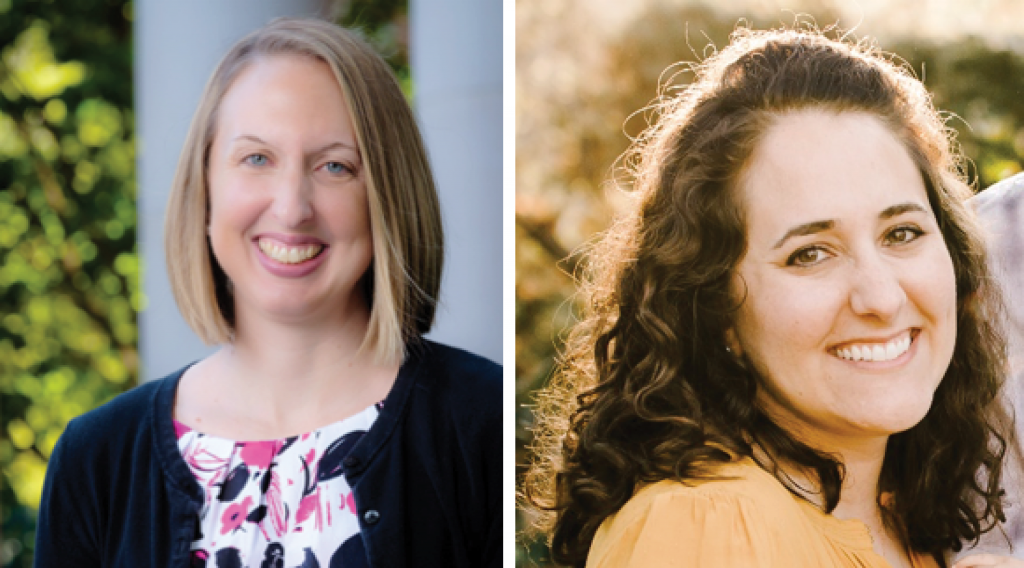Green Team Captain Spotlight: Hilary Floyd and Michelle Ford

by Office of Sustainability Staff Writer Suzy Mullins (’18)
The Green Team Network allows members of WFU faculty and staff to learn and collaborate across campus in efforts of integrating sustainability into the workplace. While the initiative provides Green Team captains with resources and leadership training, each captain implements their skills in ways which best support their department or office.
There are currently 61 Green Team captains, all of whom serve as peer leaders for their office or department. Today, the spotlight is on Hilary Floyd, the Divinity School’s captain, and Michelle Ford, the captain for the Biology Department, who will share more about their Wake Forest Green Team experiences.
Is your office or department needing a Green Team representative? Email sustainability@wfu.edu to start the conversation.
Hilary Floyd, Wake Forest School of Divinity
Q: What kinds of work are you involved with at Wake Forest?
A: My job is to provide individual academic coaching for Divinity students, offer academic skills workshops, and to teach courses in research and writing. I also coordinate a leadership program for early career pastors as a part of our continuing education efforts. Additionally, I provide administrative and logistical support for our Food, Health, and Ecological Well-Being program.
Q: What drew you to joining the Green Team and becoming a captain?
A: Because of my work for the Food, Health, and Ecological Well-Being Program, joining the Green Team seemed like a natural fit. Much of what we hope to do through the FHEW program is to integrate an ecological and sustainable consciousness throughout the courses, activities, and community life of the Divinity School, so it is useful and relevant that we connect that work with the efforts of the Office of Sustainability and the Green Team.
Q: What does being on the Green Team mean to you?
A: I enjoy being on the Green Team because it gives me the opportunity to connect with others across campus and to learn from them about ways to effect positive change. The Green Team focuses on empowering each of us to do what we can where we are, and it has given me knowledge, tools, and encouragement to take small but meaningful steps in the Divinity School.
Q: What kinds of initiatives have you implemented through your Green Team work?
A: This past year, I met with several of our students who are interested in the intersection of faith, food, and ecology to discuss reviving our composting efforts. The students now set up a compost bin at our community lunches every Tuesday and Thursday, and they take the compost to the Campus Garden. I also have worked with the other Divinity staff members who order paper for faculty, staff, and student printers, and I encouraged them to consider ordering 100% recycled paper. Previously, they had been ordering paper with no recycled content, but after I shared with them what we had learned about recycled paper in one of our Green Team meetings, they were happy to make the change.
Michelle Ford, Wake Forest Biology Department
Q: What kinds of work are you involved with at Wake Forest?
A: I am an administrative assistant in the Biology Department, so I do a lot of different things to assist the biology faculty—from making copies to defrosting lab freezers, I tackle it all!
Q: What drew you to joining the Green Team and becoming a captain?
A: I inherited the responsibility from my predecessor, but it was actually a great fit for me because I held a similar position on a similar type of team at my previous employer! I enjoy trying to find ways to conduct department business in a manner that is practical, functional, and also earth-friendly.
Q: What does being on the Green Team mean to you?
A: To me, being on the Green Team means that while I am doing my normal work, I also try to view everything through a sustainability lens. I always ask myself, “Is there a way that we could do this and achieve the same goal, but have less of an environmental impact?” Maybe that involves printing less, using recycled paper, or buying supplies manufactured with recycled materials, but there is usually some way to improve our process to make it a little bit more “green.”
Q: What kinds of initiatives have you implemented through your Green Team work?
A: In the Biology department, we have switched to 100% recycled paper for our printing needs, and have also implemented the use of compost bins at our departmental events. We are also planning to start a summer energy-saving initiative in which we raise the temperature of our ultra-low temperature freezers from -80° C to -70°C.
